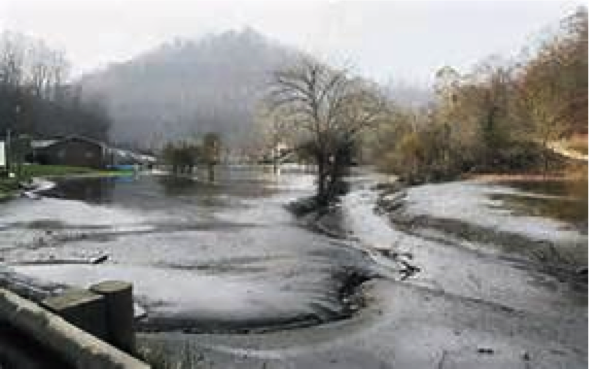By Alex Potter-Weight
 More than 80 Pittsburgh Geological Society and ASCE members and guests gathered at the Foster’s Restaurant on Wednesday, January 20th for a joint meeting of PGS and the Geo-Institute. As part of the meeting, Peter R. Michael, PG, presented the lecture “Preventing Coal Waste Impoundment Breakthroughs into Underground Mines.” The topic featured a famous case study of a breakthrough in eastern Kentucky in 2000, and included recommendations for preventing future events and recent research on the subject of coal waste flow.
More than 80 Pittsburgh Geological Society and ASCE members and guests gathered at the Foster’s Restaurant on Wednesday, January 20th for a joint meeting of PGS and the Geo-Institute. As part of the meeting, Peter R. Michael, PG, presented the lecture “Preventing Coal Waste Impoundment Breakthroughs into Underground Mines.” The topic featured a famous case study of a breakthrough in eastern Kentucky in 2000, and included recommendations for preventing future events and recent research on the subject of coal waste flow.
On October 11, 2000, over 300 million gallons of water and coal waste slurry drained from a coal waste impoundment in Martin County, Kentucky into an adjacent underground coal mine. Most of that material then discharged from two mine portals and affected more than 75 miles or rivers and streams in the surrounding area.
To prevent future catastrophic events, the U.S. Office of Surface Mining Reclamation and Enforcement (OSMRE) and partnering agencies undertook a significant investigation of possible causes and an assessment of current coal waste impoundment practices. Mr. Michael took part in this project with OSMRE and one of the key points in his presentation focused on proper initial accounting of all mineable coal seams in the vicinity of the facility. He demonstrated why sole reliance on existing mine maps should be avoided and that other methods such as local interviews, drilling, and geophysical investigations should be considered. These practices allow for more accurate and complete identifications of underground mines that could affect the stability of the impoundment. Next, Mr. Michael discussed the importance of analyzing the quality of the existing barriers preventing breakthroughs. Finally, the presentation concluded with an in-depth discussion of the properties of coal waste slurries and the features that would indicate high flowability. An analysis of flow properties of coal waste was recently performed by Dr. David Zeng of Case Western Reserve University. The research focused primarily on the moisture content and plasticity of the material in determining the susceptibility of the waste slurries to high flow rates.
Attendees earned 1.0 Professional Development Hour (PDH) for the presentation from the Pittsburgh Geological Society and the Geo-Institute Chapter of the ASCE Pittsburgh Section. This annual joint technical dinner meeting between the two societies also included a social hour to network with other professional leaders, and a buffet dinner.
